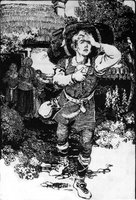Tuesday, August 29, 2006
Monday, August 21, 2006
Gone (Again)
 As the summer winds down, my wife and I have been able to work our schedules so that we get one more week away. We'll be up at the cottage until Thursday or so. We're looking forward to just being somewhere quiet together for a few days. On Wednesday night we're seeing the play version of "Anne of Green Gables." I hope to spend a good portion of each day reading, in preparartion for the module course on persecution and discipleship I'll be taking next week at school. Needless to say, I won't be posting until I get back.
As the summer winds down, my wife and I have been able to work our schedules so that we get one more week away. We'll be up at the cottage until Thursday or so. We're looking forward to just being somewhere quiet together for a few days. On Wednesday night we're seeing the play version of "Anne of Green Gables." I hope to spend a good portion of each day reading, in preparartion for the module course on persecution and discipleship I'll be taking next week at school. Needless to say, I won't be posting until I get back.
Posted by
Julian Freeman
at
10:50 a.m.
1 improvement(s)
![]()
Saturday, August 19, 2006
A Little More on Humility...
This past year in my Early Christian Spirituality course at TBS we had a lecture on Basil of Caesarea's theology of humility. His twentieth homily was full of great theological insight and practical suggestions for how to live with greater humility.
One of his suggestions for how to stir up humility is simply to recall one's past sins. It is only possible for me to become proud and think more highly of myself than I ought when I forget what I ought to think of myself--namely, when I forget what I've done and what I deserve from a holy God.
Sometimes, however, instead of genuine humility, I find that meditating on past sins (or even present sinfulness) just produces feelings of guilt and regret. I think about wrong things that I've done and how horrible they were. Then I think about the ongoing consequences of things I've done (how I've made people feel or things that happen to others as a result of my sins) and it just gets worse. The trouble of course is that my focus is on the wrong place. The thing which should create in me the deepest and truest humility is looking at the cross. Despite what I so often see, the worst consequence of my sin isn't the hurt feelings of other people--it is the death of the Son of God. As the hymnwriter put it:
The trouble of course is that my focus is on the wrong place. The thing which should create in me the deepest and truest humility is looking at the cross. Despite what I so often see, the worst consequence of my sin isn't the hurt feelings of other people--it is the death of the Son of God. As the hymnwriter put it:
"Thus while his death my sin displays in all its blackest hue..."The truth is that while the cross reveals grace and mercy, wrath and justice, it also reveals truth about me. Nowhere do I see the true end of all my sins and my sinful heart better than in the cross.
 What is the cross? It is the place where the only one who was ever innocent, the only one who was ever truly pure, was beaten and mocked, whipped and murdered for me. Why? Because that's what my sins deserve.
What is the cross? It is the place where the only one who was ever innocent, the only one who was ever truly pure, was beaten and mocked, whipped and murdered for me. Why? Because that's what my sins deserve.But the hymnwriter didn't stop there...
"Thus while his death my sin displays in all its blackest hue,This is the mystery of grace in the wonder of the cross. The only truly beautiful, truly innocent, truly perfect man to walk this earth in nothing but love became the victim of violent hatred--and I was the offender. But yet, in this--the greatest of all travesties, that God would be rejected by man--my pardon is sealed. It is complete. He accomplished it all.
Such is the mystery of grace, it seals my pardon too"
In the cross I see the absolute depravity of my sin... the absolute godlessness of my soul left to its own power. If given my way, I would kill God. But here's the irony: in God's grace, my God was killed for me. What wonderful grace!
How can the recipient of such grace know anything but humility? How can pride find a place in any heart which has rightly evaluated the cross?
"Thus while his death my sin displays in all its blackest hue,Go figure: the answer to something in the Christian's life is to look more to the cross... who would've thought? No fancy programs, no insider-tricks... just look to the cross.
Such is the mystery of grace, it seals my pardon too.
With pleasing grief, and mournful joy, my spirit now is filled;
That I should such a life destroy... yet live by him I killed."
What does it mean that Christ died for me? It means my sin deserved death. If my sin doesn't deserve death, and Christ died, then we mock the cross and make God out to be a liar. The cross, then, was superfluous.
But if my sin was so deep that I would desire the death of God, and that I deserved the eternity of punishment Christ bore on my behalf, then I need to do some serious thinking about who and what I really am. This type of thinking can lead only to deepest despair for those outside of Christ. But it will lead to endless joy and deepest hope for those who have seen their burdens tumble to the sepulchre.
Posted by
Julian Freeman
at
10:24 p.m.
1 improvement(s)
![]()
Thursday, August 17, 2006
Kerux's Cleezer is... CUTE?!
 So, you'd think a guy who blogs this much about his 'manly' truck would avoid referring to it as 'cute' wherever possible.
So, you'd think a guy who blogs this much about his 'manly' truck would avoid referring to it as 'cute' wherever possible.
Well, Kerux is just full of surprises. The other day he called me to come help him put this cap on his truck, which I was glad to do. Afterward, however, I was quite surprised when we went inside and his wife mentioned that Cleezer just wasn't quite as 'cute' with the cap.
That's fine. No big deal. Women get confused about such things. They think all kinds of things are 'cute' or 'fun' that guys just wouldn't describe that way.
The thing that floored me is that Kerux agreed! Which, of course, implies that he did indeed think his truck was cute before (and since it was more cute before, that implies that there is still some element of cuteness present)! To my even greater surprise, he was disappointed that his 'truck' (can we still call it that now?!) is no longer quite so cute, thus implying that having his truck be cute is obviously what he is aiming for.
Now that is disturbing. At least Derifter was offended when I referred to his little red S-10 as 'pretty.' Maybe Derifter needs to talk to Kerux.
Just for the record, I think that The Cleez is a beauty of a truck that I would be proud to be seen in (as Kerux is, in this picture). This comment is not a knock on the Cleez as much as a question about her owner. :)
Posted by
Julian Freeman
at
8:28 p.m.
3
improvement(s)
![]()
Wednesday, August 16, 2006
Bunyan on How to Mortify Our Longings for Egypt
 Here is a scene I read last night from Bunyan's immortal Pilgrim's Progress. In this excerpt, Christian (an allegorical figure representing a believer on his journey through life to heaven, ie. Zion) is having a conversation with a lady named Prudence. She asks him if he sometimes still longs for his home country (ie. the life he used to live). Bunyan's insights on how to overcome indwelling sins of the mind here are priceless. Enjoy!
Here is a scene I read last night from Bunyan's immortal Pilgrim's Progress. In this excerpt, Christian (an allegorical figure representing a believer on his journey through life to heaven, ie. Zion) is having a conversation with a lady named Prudence. She asks him if he sometimes still longs for his home country (ie. the life he used to live). Bunyan's insights on how to overcome indwelling sins of the mind here are priceless. Enjoy!
PRUDENCE: Do you not think sometimes of the country from whence you came?
CHRISTIAN: Yea, but with much shame and detestation. Truly, if I had been mindful of that country from whence I came out, I might have had opportunity to have returned; but now I desire a better country, that is, a heavenly one (Heb. 11:15,16).
PRUDENCE: Do you not yet bear away with you some of the things that then you were conversant withal?
CHRISTIAN: Yes, but greatly against my will; especially my inward and carnal cogitations, with which all my countrymen, as well as myself, were delighted. But now all those things are my grief; and might I but choose mine own things, I would choose never to think of those things more: but when I would be a doing that which is best, that which is worst is with me (Rom. 7:15, 21).
PRUDENCE: Do you not find sometimes as if those things were vanquished, which at other times are your perplexity?
CHRISTIAN: Yes, but that is but seldom; but they are to me golden hours in which such things happen to me.
PRUDENCE: Can you remember by what means you find your annoyances at times as if they were vanquished?
CHRISTIAN: Yes: when I think what I saw at the cross, that will do it; and when I look upon my broidered coat, that will do it; and when I look into the roll that I carry in my bosom, that will do it; and when my thoughts wax warm about whither I am going, that will do it.
PRUDENCE: And what is it that makes you so desirous to go to Mount Zion?
CHRISTIAN: Why, there I hope to see Him alive that did hang dead on the cross; and there I hope to be rid of all those things that to this day are in me an annoyance to me: there they say there is no death, (Isa. 25:8; Rev. 21:4) and there I shall dwell with such company as I like best. For, to tell you the truth, I love Him because I was by Him eased of my burden; and I am weary of my inward sickness. I would fain be where I shall die no more, and with the company that shall continually cry, 'Holy, holy, holy.'
Posted by
Julian Freeman
at
10:01 a.m.
3
improvement(s)
![]()
Wednesday, August 09, 2006
Gone
My friend Tim and I are leaving this morning to attend WorshipGod06, put on by Sovereign Grace Ministries. I don't know that I'll be blogging at all while I'm gone, but check Tim's blog for regular updates as he live-blogs all the goings-on.
Posted by
Julian Freeman
at
8:20 a.m.
0
improvement(s)
![]()
Tuesday, August 08, 2006
kerux noemata: Mainline Christianity is Dead: And Why that is A Good Thing
Kerux sounds in with some important thoughts--well worth the read. Enjoy!
Mainline Christianity is Dead: And Why that is A Good Thing
Posted by
Julian Freeman
at
3:07 p.m.
0
improvement(s)
![]()
From Poverty of Spirit to Riches of Wisdom
I have had the privelege of filling the pulpit at Grace Fellowship Church for the past few weeks while 'the preacher' (aka kerux) was away on vacation. The past two Sunday nights I tried to draw some more practical thoughts together with regards to poverty of spirit (see here, here, here, and here for the series I started, and to which I hope to return shortly).
This message's title was 'From Poverty of Spirit to Riches of Wisdom.' The basic premise is that if we are broken before God, we will be humble before others (poverty of spirit) and that this will result in true life change (ie. wisdom: the ability to live skillfully, in a way that pleases God in the midst of a fallen world). In order to live wisely, we must be humble.
Here's the outline:
- Humility allows us to gain wisdom (verses)
- Humility make us able to take reproof / correction (verses)
- Humility leads us to avoid temptation (verses)
- Humility leads to less talking and therefore less sin (verses)
- Humility makes it easier to admit guilt & need for reconciliation (verses)
- Humility gives ability to be content with less (verses)
- The humble one aligns himself with the Lord (verses)
- Humility allows us to treat all others fairly (verses)
- Humility gives us ability to accept what comes in life (verses)
- Humility allows us to have genuine, godly friendships (verses)
Posted by
Julian Freeman
at
1:39 p.m.
0
improvement(s)
![]()
Friday, August 04, 2006
Sing All the Verses -- Part 3
This is the last installment in this series, unless I stumble across something pretty amazing. This time I want to point out that two of our most famous (and deserving so!) hymns that we've sung in our churches for years are missing verses. Since the hymns are so popular I won't post all the verses, just the ones that are usually missing (how's that for irony?). If you want to see all the words, check here and here.
(5th of 6 verses, appeared between the verse when the chains fall off
his soul and the verse that begins 'No condemnation now I dread...')
Still the small inward voice I hear,
That whispers all my sins forgiven;
Still the atoning blood is near,
That quenched the wrath of hostile Heaven.
I feel the life His wounds impart;
I feel the Saviour in my heart.
When I Survey the Wondrous Cross
(Originally the 4th verse, between 'See from his head, his hands...'
and 'Were the whole realm...')
His dying crimson, like a robe,
Spreads o’er His body on the tree;
Then I am dead to all the globe,
And all the globe is dead to me.
I don't know why these started getting left out, but who cares. The point is, we should sing them! They're great! So if you know your 'worship leader' or if you lead your services... sing them! :)
Posted by
Julian Freeman
at
12:38 p.m.
2
improvement(s)
![]()
Thursday, August 03, 2006
Sing All the Verses--Part 2
Okay, honestly, who knew that what we usually sing as the Doxology has more than one verse?! It's true. The words were written by Thomas Ken, published in the Manual of Prayers for the Use of the Scholars of Winchester College, in 1674.
Ken wrote this hymn at a time when the established church believed only Scripture should be sung as hymns, with an emphasis on the Psalms. Some considered it sinful and blasphemous to write new lyrics for church music, akin to adding to the Scriptures. In that atmosphere, Ken wrote this and several other hymns for the boys at Winchester College, with strict instructions that they use them only in their rooms, for private devotions. Ironically, the last stanza has come into widespread use as the Doxology, perhaps the most frequently used piece of music in public worship. At Ken’s request, the hymn was sung at his funeral, fittingly held at sunrise.
Here are all the great words. It is a song we would all well be able to use in our morning devotions, even now, 330-some-odd years later. Enjoy!
Thy daily stage of duty run;
Shake off dull sloth, and joyful rise,
To pay thy morning sacrifice.
Thy precious time misspent, redeem,
Each present day thy last esteem,
Improve thy talent with due care;
For the great day thyself prepare.
By influence of the Light divine
Let thy own light to others shine.
Reflect all heaven’s propitious ways
In ardent love, and cheerful praise.
In conversation be sincere;
Keep conscience as the noontide clear;
Think how all seeing God thy ways
And all thy secret thoughts surveys.
Wake, and lift up thyself, my heart,
And with the angels bear thy part,
Who all night long unwearied sing
High praise to the eternal King.
All praise to Thee, Who safe has kept
And hast refreshed me while I slept
Grant, Lord, when I from death shall wake
I may of endless light partake.
Lord, I my vows to Thee renew;
Disperse my sins as morning dew.
Guard my first springs of thought and will,
And with Thyself my spirit fill.
Direct, control, suggest, this day,
All I design, or do, or say,
That all my powers, with all their might,
In Thy sole glory may unite.
I would not wake nor rise again
And Heaven itself I would disdain,
Wert Thou not there to be enjoyed,
And I in hymns to be employed.
Heav’n is, dear Lord, where’er Thou art,
O never then from me depart;
For to my soul ’tis hell to be
But for one moment void of Thee.
Praise God, from Whom all blessings flow;
Praise Him, all creatures here below;
Praise Him above, ye heavenly host;
Praise Father, Son, and Holy Ghost.
Posted by
Julian Freeman
at
9:08 a.m.
5
improvement(s)
![]()
Wednesday, August 02, 2006
I Love Scripture!
 Yesterday I got to read through a portion of 1 Kings. My favourite part of what I read was Solomon's building and dedication of the temple. After reading from Genesis all the way through to 1 Kings, it is a wonderful breath of fresh air!
Yesterday I got to read through a portion of 1 Kings. My favourite part of what I read was Solomon's building and dedication of the temple. After reading from Genesis all the way through to 1 Kings, it is a wonderful breath of fresh air!
I think sometimes we lose sight of just how momentous an occasion this really was. Finally... after slavery, the exodus, the 40 years of wandering, the failed conquest of the promised land, the pathetic time of the judges, the first king becoming a miserable failure, a lifetime of war and tumult under David... finally, peace! Finally, God's people are able to construct a permanent fixture where God will be honoured and worshiped. It is the place where he has chosen to make his name dwell. So Solomon has construction of the temple completed, he brings in the ark of the covenant, and offers his prayer of dedication. It's a wonderful scene of celebration and worship of our God as innumerable sacrifices were offered. God is pleased to come down and dwell in his temple--so much so that the priests could not stand to minister in the Holy Place because the glory of YHWH filled the house.
So Solomon has construction of the temple completed, he brings in the ark of the covenant, and offers his prayer of dedication. It's a wonderful scene of celebration and worship of our God as innumerable sacrifices were offered. God is pleased to come down and dwell in his temple--so much so that the priests could not stand to minister in the Holy Place because the glory of YHWH filled the house.
The temple is the place where God dwells and where man can meet with him--the place where God and man dwell together. It is the place where God's glory abides, where he reveals himself to his people.
Solomon's prayer of dedication is then largely concerned with the request of God that whenever God's people pray toward this temple--where God and his people can meet together, where God himself dwells--these prayers will be heard and answered. This is to be true, even when they have sinned, this will be the way they are to pray for reconciliation--pray toward the temple.
And so Solomon, the king, prays for his people. He intercedes for them before the Lord, pleading with God that their sins will be forgiven and that he will have mercy on them.
The glory of God had descended on this place, the Lord had met with his people and heard the prayers of Solomon--why? All of this is made possible--God's people can approach God in his temple--because of the sacrifices they had made. They sacrificed before the ark as they brought it in, and once Solomon had prayed they offered more: 22,000 oxen, and 120,000 sheep as peace offerings to God.
But all of this was still imperfect, in some sense, because we see that where the holiness and the glory of God dwell, the priests still aren't able to be. After a while, the priests are forced to leave the Holy Place where they ministered because of the presence of God.
Of course, what I love the most about all this is Jesus. Where was he? Where wasn't he?! Jesus is the temple--the perfect meeting place of God and man. In him the fullness of deity dwells bodily. He said, 'destroy this temple and I will raise it in three days.' But of course, he was not referring to the temple of stone, but the temple of his flesh--where God and man truly come together. And because he is the fulfillment of the temple, he's also the reason our prayers are offered freely to God now, because we pray through Christ.
But Christ is more than the temple and the reason our prayers are heard. He's also the true Solomon--the true Son of David who will inherit the eternal throne and promises of God. As the true Son of David and the true King, Jesus is the one true intercessor for his people! Now he offers prayers to God on our behalf!
And of course, Jesus is the true sacrifice which makes God's meeting with his people possible at all. Jesus is the perfect 'once for all' sacrifice for the sins of God's people, that every single one of his people would be perfectly covered and able, finally, to meet with God.
And lastly, it has all been made perfect now, through Christ, because we no longer have to worry about imperfect priests, unable to draw near in the earthly temple, because the earthly temple was only ever 'copy' and a 'shadow' anyway! Now, Christ, who is the true high priest, draws near to God in the perfect, heavenly temple on our behalf.
I could go on and on, but this is too long already. What an absolutely wonderful God! What a wonderful Saviour! What a wonderful book that ties all these things so beautifully together. No wonder Christ said he's the fulfillment of the whole thing! He well deserves the name that is above all names.
Posted by
Julian Freeman
at
9:18 a.m.
2
improvement(s)
![]()
.jpg)



